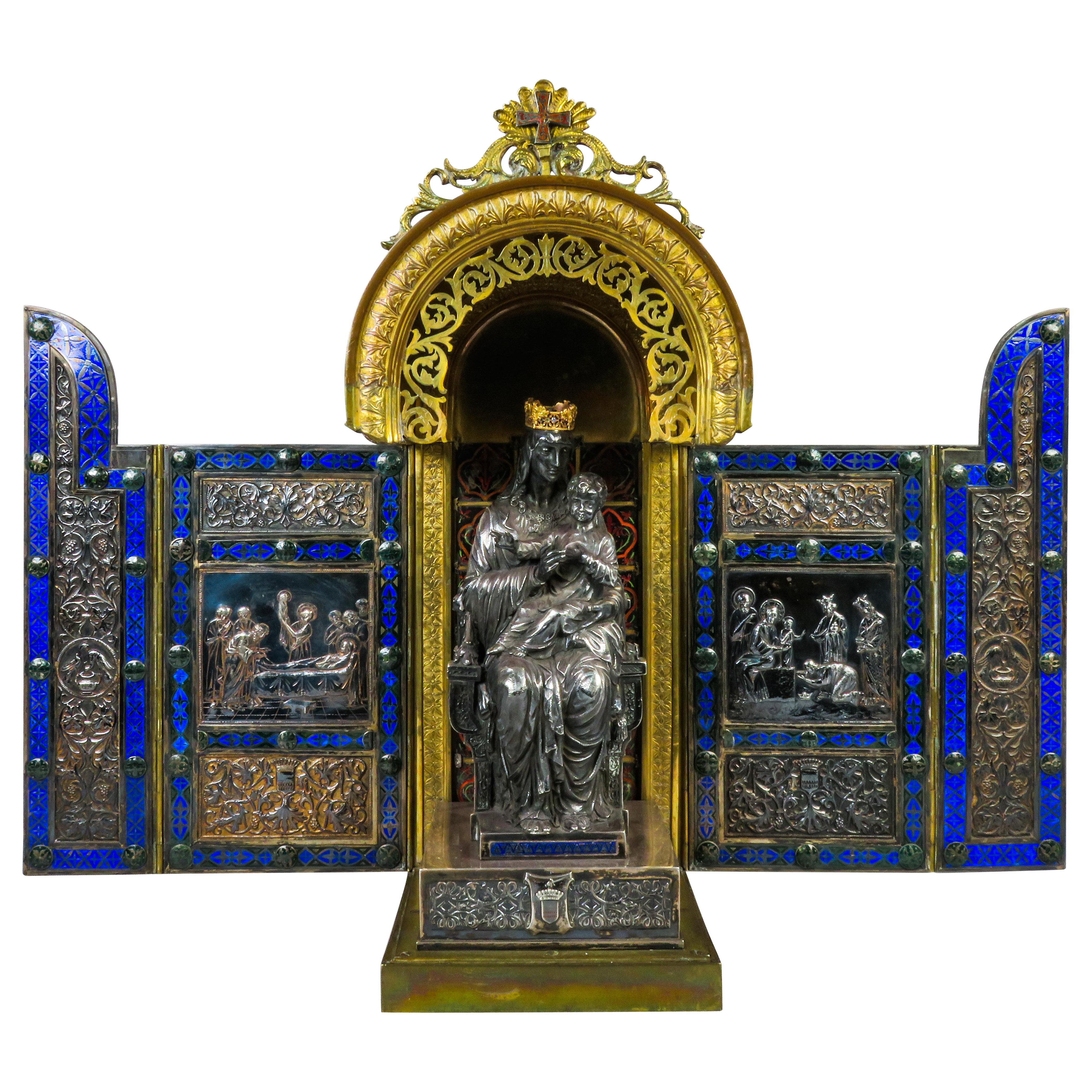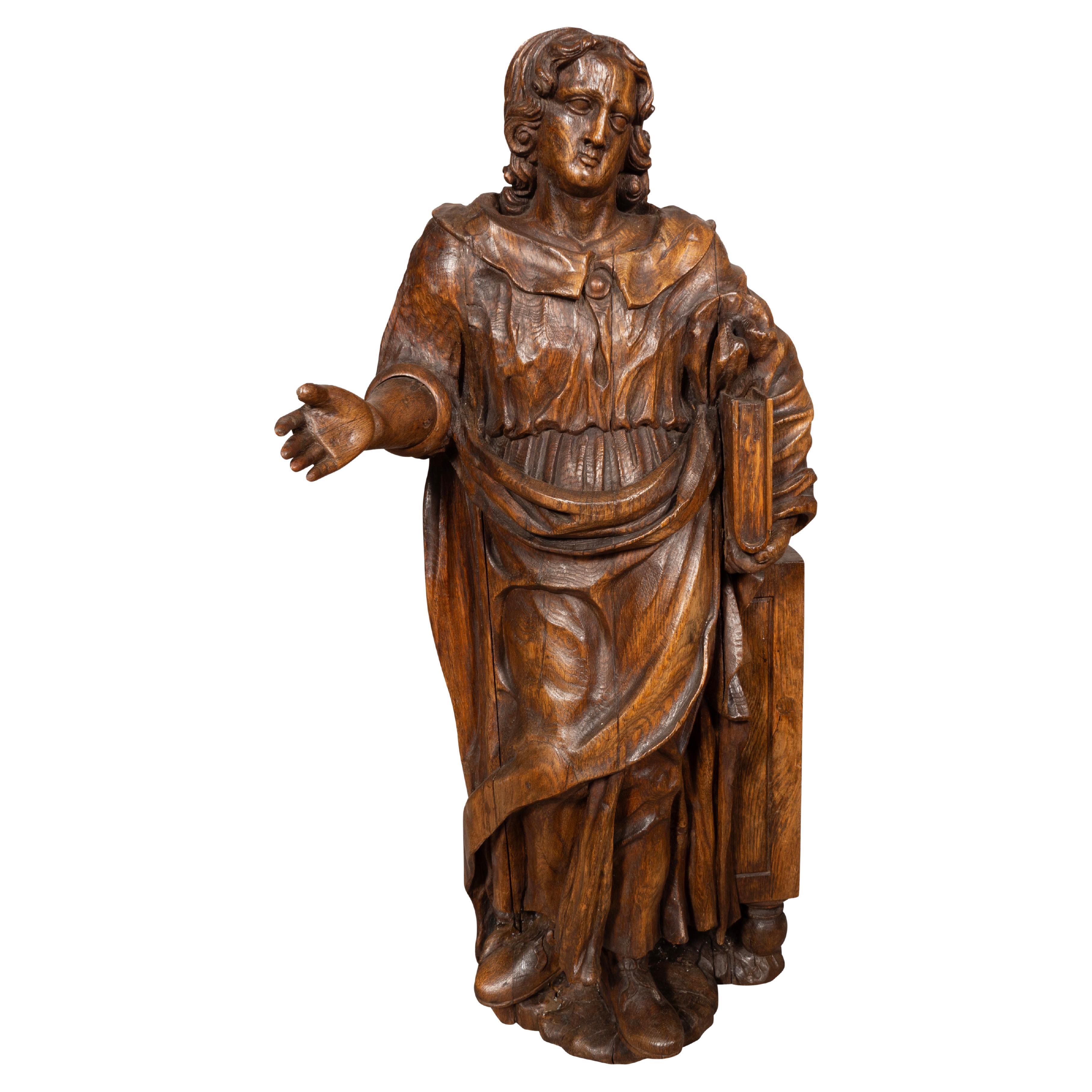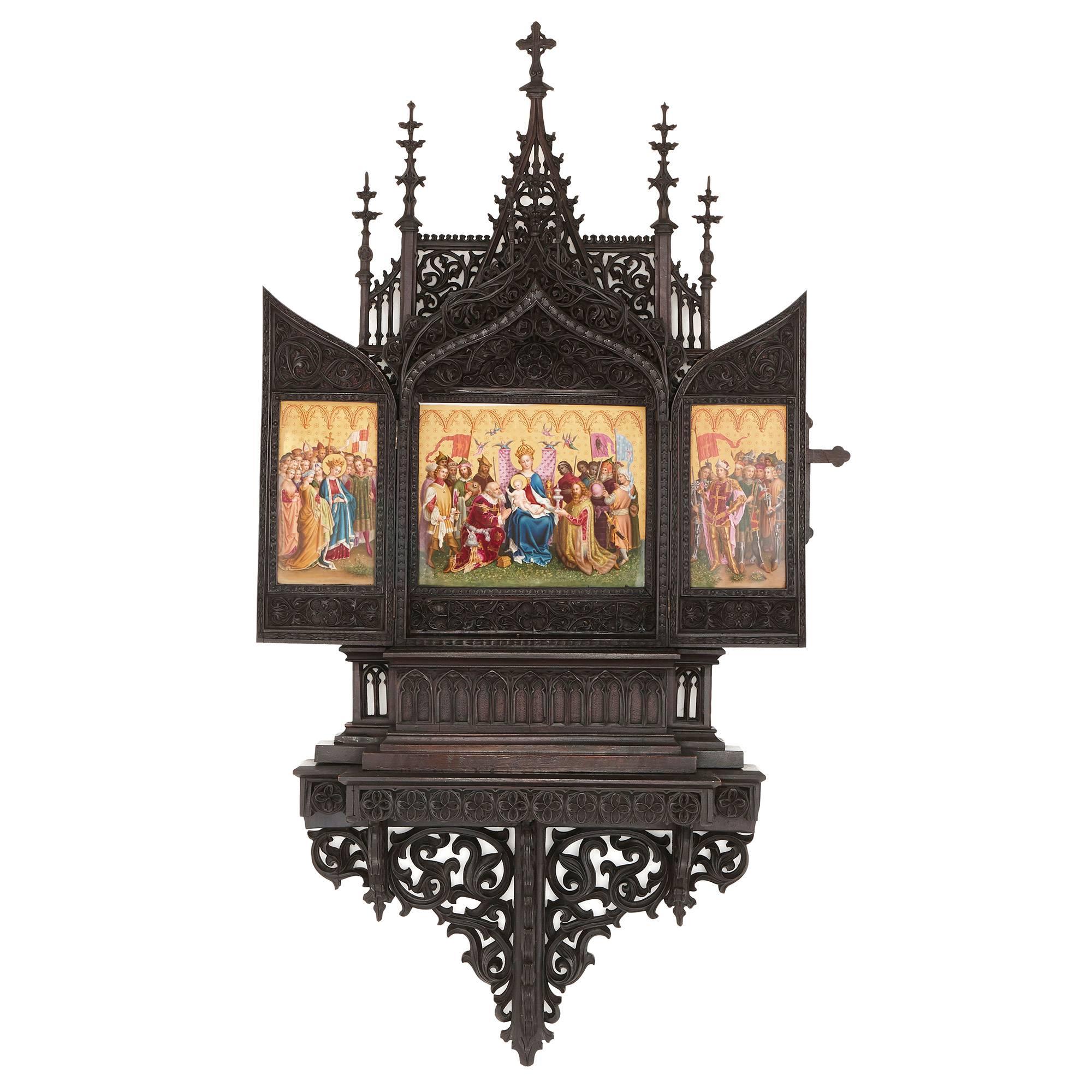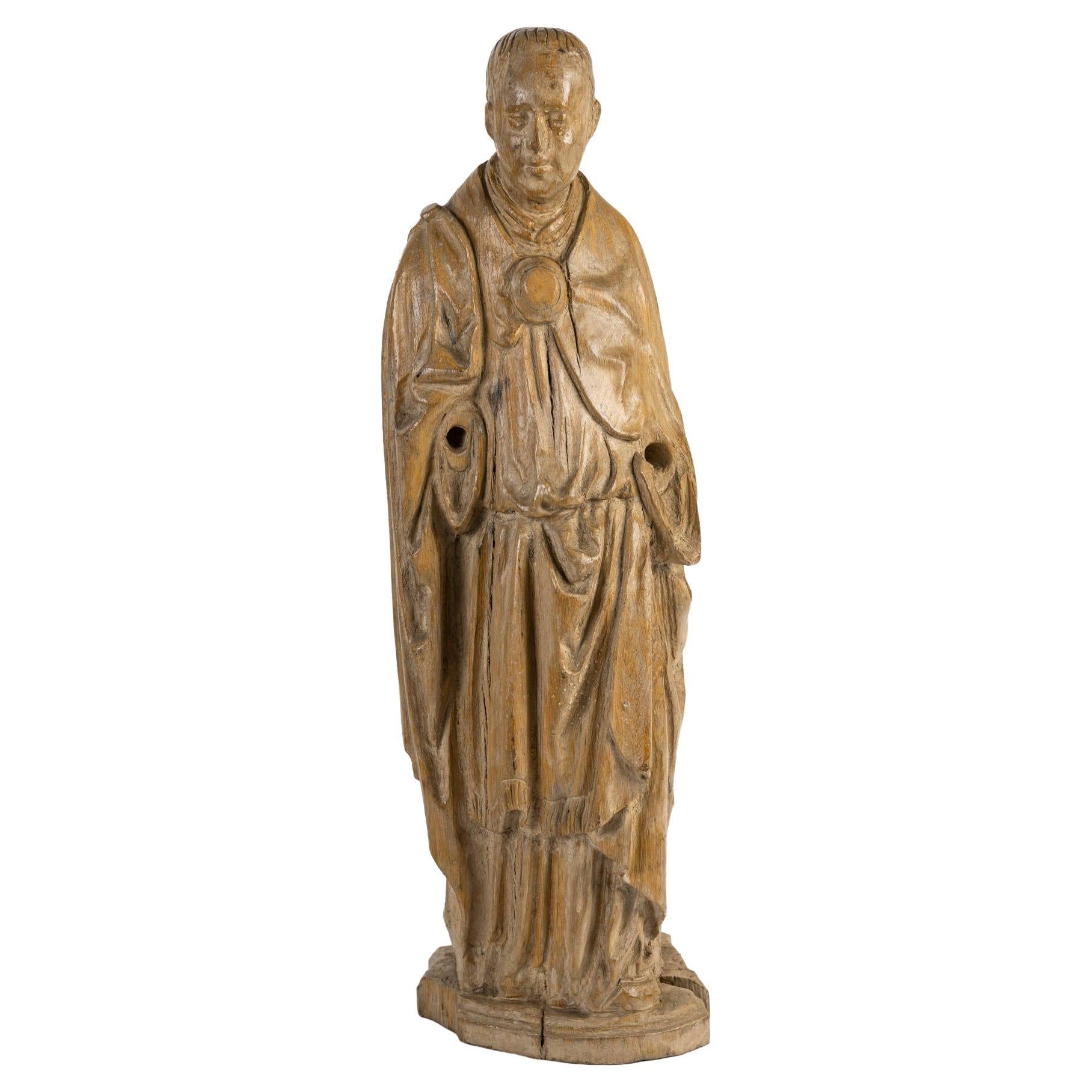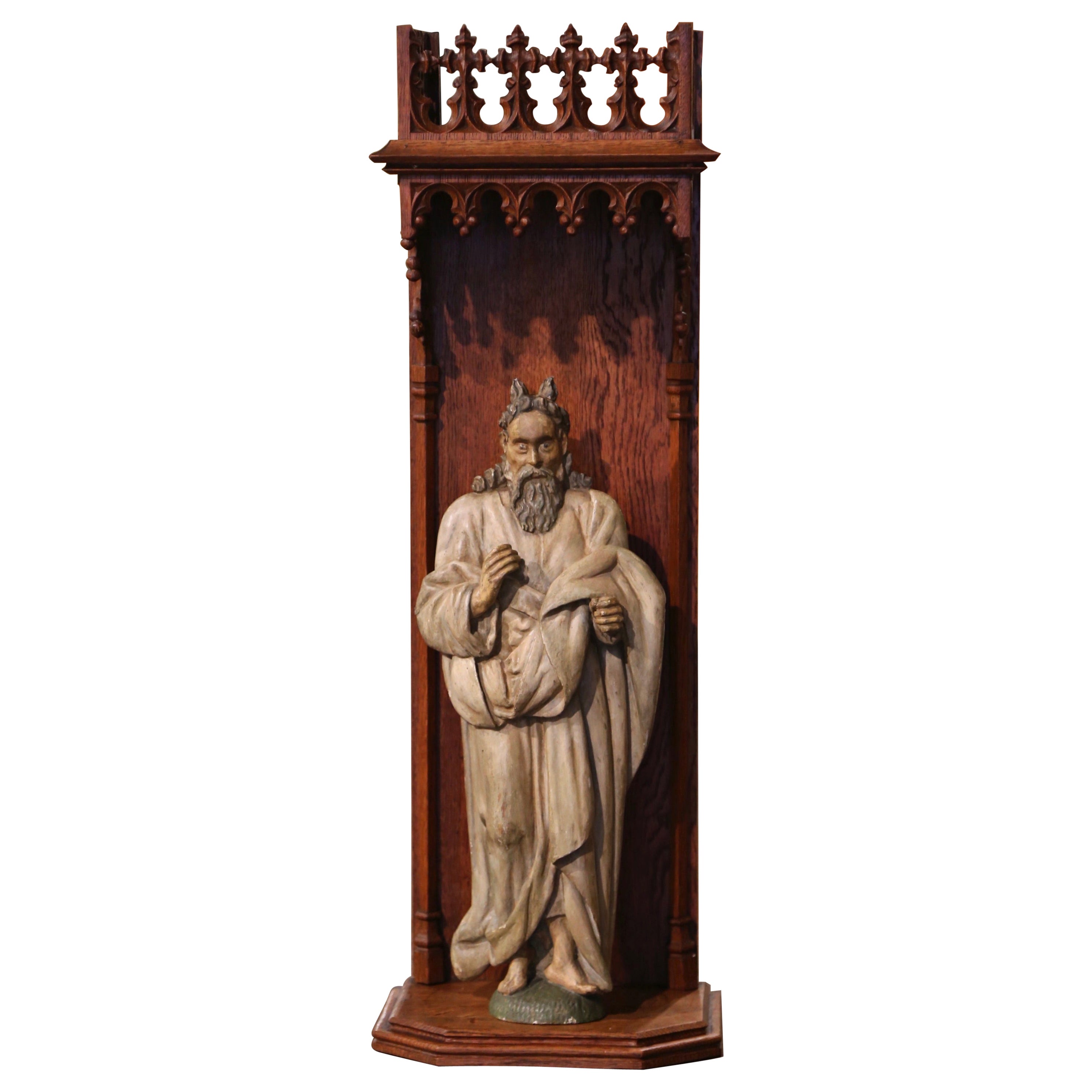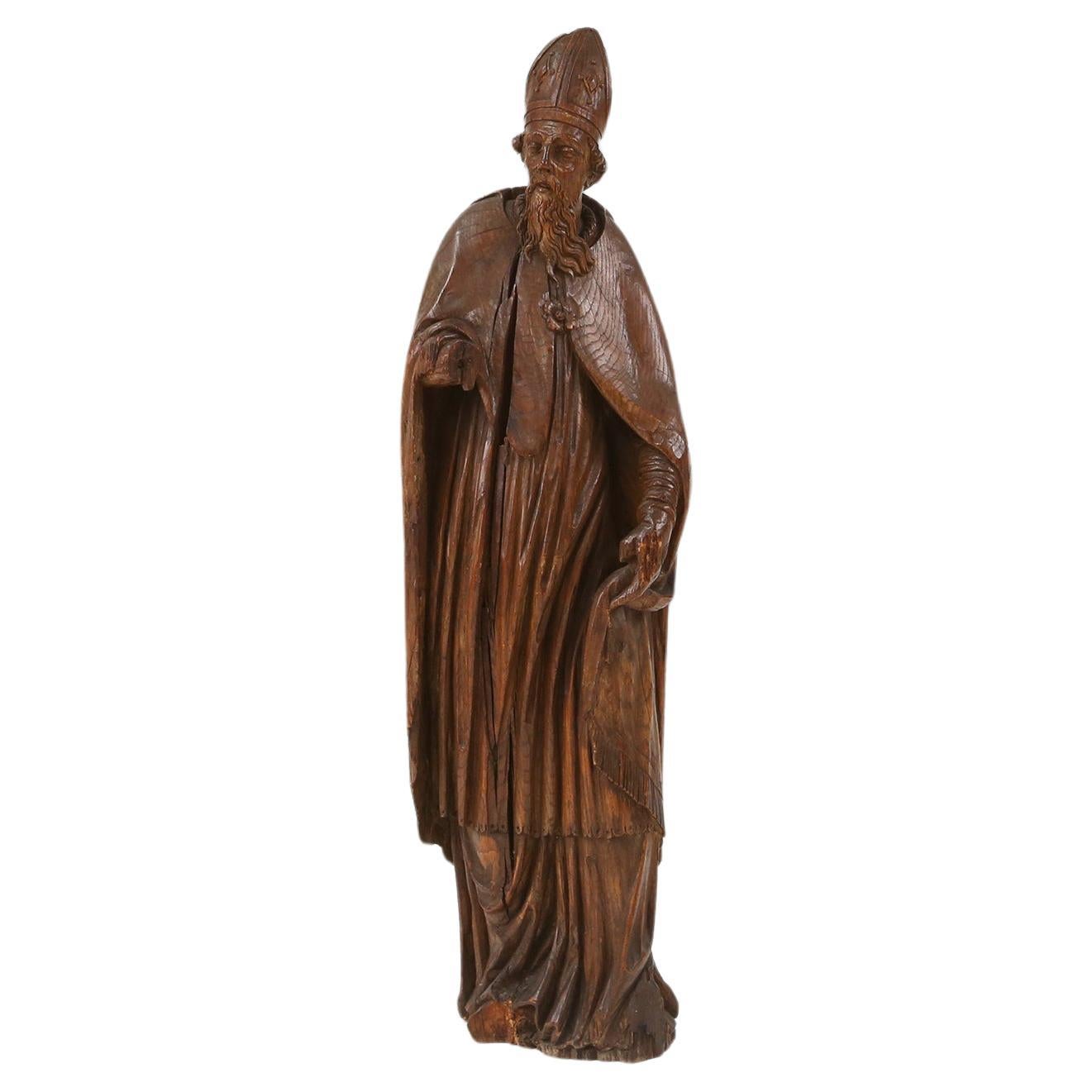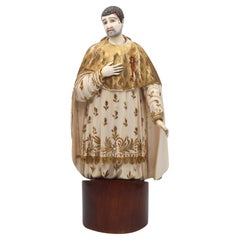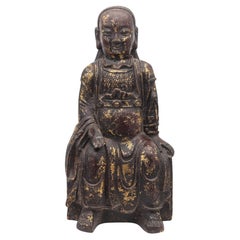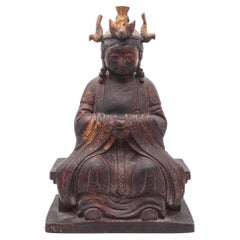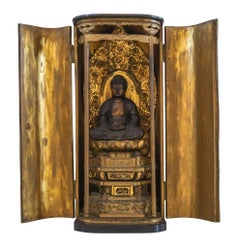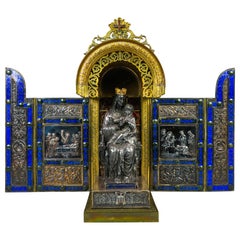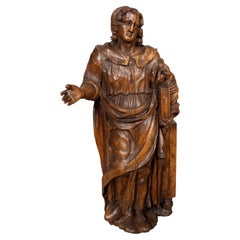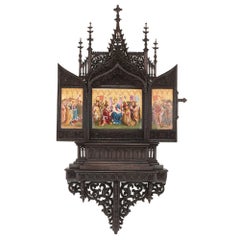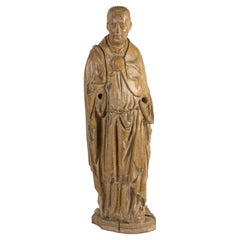Items Similar to Flemish 1850 Carved Sculpture Triptych of Emperor Charlemagne Enthroned
Want more images or videos?
Request additional images or videos from the seller
1 of 11
Flemish 1850 Carved Sculpture Triptych of Emperor Charlemagne Enthroned
$2,248.50
$2,99825% Off
£1,707.05
£2,276.0725% Off
€1,956.23
€2,608.3125% Off
CA$3,191.45
CA$4,255.2625% Off
A$3,481.06
A$4,641.4225% Off
CHF 1,828.69
CHF 2,438.2625% Off
MX$42,113.73
MX$56,151.6425% Off
NOK 22,877.53
NOK 30,503.3725% Off
SEK 21,600.94
SEK 28,801.2625% Off
DKK 14,601.90
DKK 19,469.2025% Off
About the Item
A carved triptych of emperor Charlemagne.
Beautiful triptych sculpture from Flemish origin made in the second quarter 19th Century, circa 1850. It was carefully carved with two ‘swinging doors which enable two different functions. When closed, the sculpture represents the crowned standing figure of the emperor Charlemagne, dressed in long ropes holding a globe and a scepter. When is open, it shows the emperor enthroned and crowned with the images of the imperial eagle. All this surrounded by people, as subjects, advisors, a cardinal standing, a knight and the figure of a crowned king kneeling and presenting his standard. The piece is exceptionally executed with fabulous intricate details.
Charlemagne
He was King of the Franks from 768, King of the Lombards from 774, and Emperor of the Carolingian Empire from 800, holding all these titles until his death in 814. Charlemagne succeeded in uniting the majority of Western Central Europe and was the first recognized emperor to rule in the west after the fall of the Western Roman Empire approximately three centuries earlier. Charlemagne's rule saw a program of political and social changes that had a lasting impact on Europe in the Middle Ages. In 800, Charlemagne was crowned as emperor in Rome by Pope Leo III. While historians' debate about the exact significance of the coronation, the title represented the height of the prestige and authority he had achieved. Charlemagne's position as the first emperor in the West in over 300 years brought him into conflict with the contemporary Eastern Roman Empire based in Constantinople. Through his assumption of the imperial title, he is considered the forerunner of the line of Holy Roman Emperors that lasted into the nineteenth century. As king and emperor, Charlemagne engaged in a number of reforms in administration, law, education, military organization, and religion which shaped Europe for centuries. The stability of his reign saw the beginning of a period of significant cultural activity known as the Carolingian Renaissance.
Charlemagne's profound impact on the Middle Ages, and the influence on the vast territory he ruled has led him to be called the "Father of Europe". He is seen as a folk hero and founding figure by many European states, and a number of historical royal houses of Europe trace their lineage back to him. Charlemagne has been the subject of artworks like this piece, monuments and literature, during and after the medieval period, and has received veneration in the Catholic Church.
Triptych
This is a work of art (usually a panel painting) that is divided into three sections, or three carved panels that are hinged together and can be folded shut or displayed open. It is therefore a type of polyptych, the term for all multi-panel works. The middle panel is typically the largest and it is flanked by two smaller related works, although there are triptychs of equal-sized panels. The triptych form appears in early Christian art and was a popular standard format for altar paintings from the Middle Ages onwards. Its geographical range was from the eastern Byzantine churches to the Celtic churches in the west. During the Byzantine period, triptychs were often used for private devotional use, along with other relics such as icons. Renaissance painters such as Hans Memling and Hieronymus Bosch used the form. Sculptors also used it. Triptych forms also allow ease of transport.
Note: This sculpture is an antique piece of art with around 175 years old.
Weight: 223.65 Grams.
Measurements: 154 mm by 91.5 mm by 48 mm (6.07 x 3.61 x 1.89 Inches).
Condition: The overall condition of this Triptych is very good. Beside the little normal wear, there is no damage, and all parts are secured in the settings. This piece has been carefully inspected to guarantee the condition and the authenticity.
INVENTORY REF: D041324XONM/.6723
- Creator:Flemish (Artist)
- Dimensions:Height: 6.07 in (15.42 cm)Width: 3.61 in (9.17 cm)Depth: 1.89 in (4.81 cm)
- Style:Gothic Revival (Of the Period)
- Materials and Techniques:
- Place of Origin:
- Period:
- Date of Manufacture:1850
- Condition:Wear consistent with age and use. The overall condition of this Triptych is very good. Beside the little normal wear, there is no damage, and all parts are secured in the settings. This piece has been carefully inspected to guarantee the condition and the authenticity.
- Seller Location:Miami, FL
- Reference Number:Seller: D041324XONM/.67231stDibs: LU8303239272362
About the Seller
5.0
Gold Seller
Premium sellers maintaining a 4.3+ rating and 24-hour response times
1stDibs seller since 2023
224 sales on 1stDibs
Typical response time: 2 hours
- ShippingRetrieving quote...Shipping from: Miami, FL
- Return Policy
Authenticity Guarantee
In the unlikely event there’s an issue with an item’s authenticity, contact us within 1 year for a full refund. DetailsMoney-Back Guarantee
If your item is not as described, is damaged in transit, or does not arrive, contact us within 7 days for a full refund. Details24-Hour Cancellation
You have a 24-hour grace period in which to reconsider your purchase, with no questions asked.Vetted Professional Sellers
Our world-class sellers must adhere to strict standards for service and quality, maintaining the integrity of our listings.Price-Match Guarantee
If you find that a seller listed the same item for a lower price elsewhere, we’ll match it.Trusted Global Delivery
Our best-in-class carrier network provides specialized shipping options worldwide, including custom delivery.More From This Seller
View AllItaly 18th Century Lombard Carved & Polychromate Sculpture of St Peter of Verona
By Veronese
Located in Miami, FL
An Italian 18th century sculpture of St. Peter of Verona.
A magnificent sculpture of St Peter martyr of Verona, created by a member of the Lombard art school in Verona Italy, in the...
Category
Antique Early 18th Century Italian Baroque Figurative Sculptures
Materials
Gold Leaf
$5,248 Sale Price
25% Off
QING DYNASTY 1850 Sculptural Enthroned Mazu Quan-Yin In Solid Gilded Bronze
Located in Miami, FL
A 19th century enthroned Mazu Quan Ying from the Qing Dynasty.
This is a beautiful antique sculptural figure of an enthroned Mazu Quan Yin, cast in bronze in high relief in the late...
Category
Antique 1850s Chinese Qing Metalwork
Materials
Bronze, Gold
$1,123 Sale Price
25% Off
QING DYNASTY 1880 Seated Enthroned Mazu Quan-Yin In Solid Gilt Bronze
Located in Miami, FL
A 19th century enthroned Mazu Quan Ying from the Qing Dynasty.
This is a beautiful antique sculptural figure of an enthroned Mazu Quan Yin, cast in bronze in high relief in the late...
Category
Antique 1880s Chinese Qing Metalwork
Materials
Bronze, Gold
$1,123 Sale Price
25% Off
JAPAN 1800 Edo Period Seated Shakyamuni Buddha In Zushi Buddhist Altar Cabinet
Located in Miami, FL
Seated Shakyamuni Buddha in a Lacquered Zushi Buddhist Altar Cabinet.
This is a remarkable Japanese wooden statue of Shakyamuni Buddha 釈迦如来坐像, from the Edo period (1600-1868). The...
Category
Antique Early 1800s Japanese Edo Sculptures and Carvings
Materials
Gold, Berlin Iron
$5,062 Sale Price / set
25% Off
JAPAN Edo Period 1850 Amida Nyorai Buddha Sculpture In Gilt Carved Wood
Located in Miami, FL
An Amida Nyorai Sculpture In Gilt Carved Wood from the Edo Period.
This is a superbly refined carved wooden figure of Amida Nyorai (Amitabha), the Buddha of Infinite Light, with fab...
Category
Antique Mid-19th Century Japanese Edo Sculptures and Carvings
Materials
Gold, Bronze, Gold Leaf
$7,462 Sale Price / set
25% Off
Erotical 19th Century Sculpture Box Of Woman Sitting On A Carved Basket In Wood
Located in Miami, FL
A 19th century erotical secret box.
Extremely rare erotic sculpture from the 19th century, most probably created in France, circa 1870. This is a sculptural box depicting a woman sitting on a woven wood basket. The sculpture represents a small discrete treasure chest to keep jewels. It was masterfully crafted from pieces of cream and brown wood carvings and is fitted with a screwable part to reveal the interior. This is an outstanding object, unobtainable on the antique market and of high collecting.
Other examples of these enigmatic boxes produced in the 19th Century.
Gilded and patinated bronze, made in France during the 3rd Empire. Ca 1870
Weight: 192.2 Grams, (123.20 Dwt).
Measurements: 150 mm by 63.5 mm by 89 mm (5.91 x 2.5 x 3.5 Inches).
Condition: The overall condition of this sculpture is excellent. Beside the little normal wear, there is no damage to any part. This erotic box...
Category
Antique 1870s French High Victorian Decorative Boxes
Materials
Wood
$2,988 Sale Price
25% Off
You May Also Like
Triptych niche with a sculpture of Virgin Mary with Child Jesus
Located in Madrid, España
Triptych niche with a sculpture of the crowned Virgin Mary with the enthroned Child Jesus located in the center, flanked by scenes from the life of the Virgin Mary on the doors. Gilt...
Category
Vintage 1920s Spanish Figurative Sculptures
Materials
Sterling Silver, Bronze
Flemish Baroque Carved Oak Figure Of A Scholar
Located in Essex, MA
Large figure standing with a book under his arm with hand extended.
Category
Antique 1660s French Baroque Figurative Sculptures
Materials
Oak
Gothic Revival Carved Oak and KPM Porcelain Triptych
By KPM Porcelain
Located in London, GB
The triptych comprises a trio of porcelain plaques, depicting the patron saints of the German city of Cologne (Köln) by the renowned Berlin manufacturer KPM (Konigliche Porzellan-Man...
Category
Antique 19th Century German Gothic Revival Religious Items
Materials
Porcelain, Oak
Carved Oak Sculpture Representing Saint Louis de Gonzague, 18th Century.
Located in Saint-Ouen, FR
Carved oak sculpture representing Saint Louis de Gonzague, 18th century.
An 18th century Italian carving of Saint Louis de Gonzague in carved oak...
Category
Antique 18th Century Italian Louis XV Figurative Sculptures
Materials
Oak
Mid-18th Century French Carved Polychrome Statue of Moses in Oak Niche
Located in Dallas, TX
Crafted in France circa 1760 and resting in a carved oak niche, the figure depicts the prophet Moses, the most important prophet in Judaism and Christianity. Moses is best known from the story in the biblical Book of Exodus and Quran as the lawgiver who met God face-to-face on Mount Sinai to receive the Ten Commandments after leading his people, the Hebrews, out of bondage in Egypt and to the "promised land" of Canaan. He is represented with horns on top of his head. The horns came about because of an ambiguity of the Latin version of Exodus 34, 30. After being addressed by God on top of Mount Sinai and given the Tablets of the Law containing the Ten Commandments, Moses descended to his people in the desert. His face was seen to shine with a divine light. (The first Moses with horns was commissioned in 1505 by Pope Julius II for his tomb; it was based on a description in chapter 34 of Exodus in the Vulgate, the Latin translation of the Bible used at that time). The religious and biblical item...
Category
Antique Mid-18th Century French Gothic Religious Items
Materials
Oak
Large rare antique statue of Saint Eligius, France ca. 1550
Located in Meulebeke, BE
France / 1550 / statue Saint Eligius / Antique / reliques
Religious statue of Saint Eligius from the 16th century in full wood found in France. This very rare find has a beautiful patina due to its old age. The hand and staff are missing. A true treasure and historical piece. The intricate carvings on the robe showcase the artisan's talent, with every fold. The natural wood grain adds a touch of warmth and authenticity to this unique piece of relic art...
Category
Antique 16th Century French Gothic Figurative Sculptures
Materials
Wood
